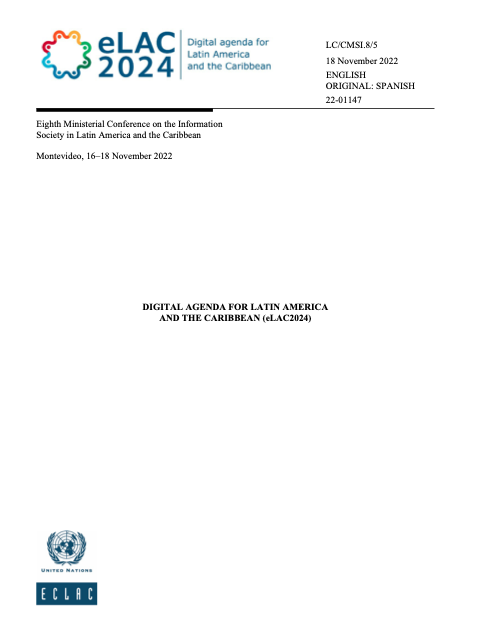Digital Agenda 2024
Policy areas
1. Digital infrastructure
The digital infrastructure is the enabling element of digital transformation processes. It is for this reason that it is critical to promote policies and agendas that seek to improve the conditions of access to the broad band under conditions of accessibility and quality in all geographic areas and in different socioeconomic segments.
2. Digital Transformation and Digital Economy
Digital technologies are impacting all economic activities, transforming processes, business models, products and value chains. To maximize the impact of these technologies on the economy, it is necessary to boost their adoption in the productive fabric, focusing on small and medium-sized companies and promoting technology-based entrepreneurship.
3. Digital government
Digital technologies offer several opportunities to improve the provision of government services, increase transparency, facilitate communication channels with citizens and promote public innovation. With this objective, governments should adopt digital transformation strategies at government level, through the definition of interoperability standards and the design of integrated systems that favor these exchanges.
4. Inclusion and digital skills and other competencies
The development of digital skills and abilities is key to promote the processes of digital transformation in organizations and companies. This requires continuous training of workers in technical and professional fields, but also a quality education system that provides the basic knowledge necessary for the development of human capital.
5. Emerging technologies for sustainable development
Emerging technologies such as artificial intelligence, the Internet of things and 5G networks are becoming an increasingly important resource to boost new industries, processes and products. Economies that are best positioned to take advantage of this context and the new industrial revolution can increase its productivity, growth and employment.
6. Confidence and digital security
Growing incidents in cybersecurity at a global level are highlighting existing vulnerabilities in the digital sphere. Security is a central element to maintain confidence in digital technologies. Event there is a broad consensus on these threats in cybersecurity, meeting these challenges is a complex topic that requires actions in different areas and fields of cooperation at local and international level.
7. Regional digital market
Digital technologies offer several opportunities to strengthen commercial exchange based on the linguistic and cultural similarities of the region. Fostering a regional digital market strategy, which reduces barriers to digital trade, must be part of the strategies of subregional integration mechanisms, through a greater integration of digital infrastructure, normative harmonization, free flow of data, and facilitation of commerce and best logistics services, among others.
8. Digital regional cooperation
The cross-border nature of digital technologies and challenges in different areas requires the promotion of a strengthened digital regional cooperation to support Internet governance processes, improving national, regional and subregional dialogue mechanisms, with the participation of public and private actors.
9. Confronting the pandemic and facilitating economic recovery and reactivation
The COVID-19 pandemic has produced an enormous economic and social crisis. Digital technologies have been essential tools to face the pandemic and improve the resilience of the economy. These technologies can be also key for economic reactivation and productive digital transformation.
